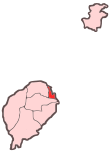Patrice Lumumba Preparatory School
| Patrice Lumumba Preparatory School Escola Preparatória Patrice Lumumba | |
|---|---|
| Address | |
 | |
Avenida Kwama N'Krume São Tomé, São Tomé Island | |
| Coordinates | 0°20′11″N 6°43′51″E / 0.3365°N 6.7309°E |
| Information | |
| Established | 21 September 1952 |
| Director | Fernando Varela[1] |
| Number of students | c. 3,000 (2015)[2] |
Patrice Lumumba Preparatory School (Portuguese: Escola Preparatória Patrice Lumumba, abbreviation: EPLP) is a lyceum located in the southwestern part of the city centre of São Tomé, São Tomé and Príncipe. It is the oldest secondary school in the country, established in 1952.[3] It currently has about 3,000 students.[2]
The one story building of the former Colégio-Liceu of São Tomé was designed by Lucínio Cruz.[4] In 1959 it was renamed Liceu Nacional D. João II, after King John II of Portugal.[5]
After independence in 1975, the school became a preparatory school, and the National Lyceum moved to the former technical school building. In 1988, in the midst of reforms of Santomean education, the school was named after Congolese leader Patrice Lumumba.[6]
See also
References
- ^ "NUSTP dá Boas Entradas ao Estudante Bruno Semedo" (in Portuguese). A Voz de São Tomé e Príncipe (Voice of São Tomé e Príncipe). 26 January 2017.
- ^ a b "Alunas da escola Patrice Lumumba afetadas por surto de alergia" (in Portuguese). Vitrina ST. 19 March 2015. Archived from the original on 16 October 2017.
- ^ Cabo Verde e São Tomé e Príncipe: Ensino Superior e Trajetórias em Portugal, Gerhard Seibert, ISCTE-IUL (2013), p. 285
- ^ Milheiro, Ana Vaz (2012). São Tomé e Príncipe e o trabalho do Gabinete de Urbanização Colonial (1944-1974) [São Tomé and Príncipe And Work of the Colonial Urbanisation Cabinet (1944-1974)]. Lisbon: University Institute of Lisbon, Central of African Studies: Actas do Colóquio Internacional São Tomé e Príncipe numa perspectiva interdisciplinar, diacrónica e sincrónica. p. 87–127. ISBN 978-989-732-089-7.
- ^ Decree-Law no. 42512 (in Portuguese). Vol. 1. Portuguese Ministry of Overseas - Director-General. 18 September 1959.
- ^ Sousa, João da Silva Pinto de. "Abordagem Histórica do Sistema Educacional de São Tomé e Príncipe Pós - Colonial (1975 – 1990)".
{{cite web}}: Missing or empty|url=(help)

